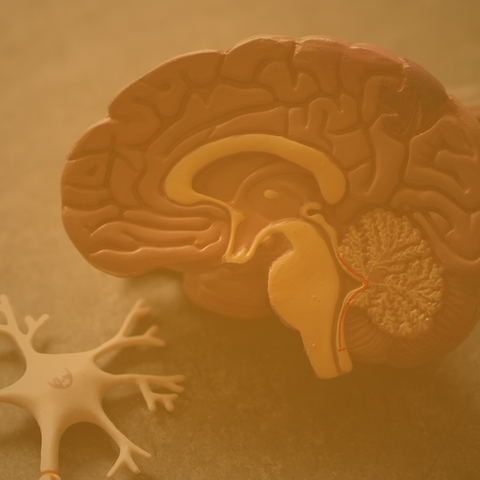
We introduced the idea that gut feelings are real, and now, it's time to dig deeper. Beyond metaphor, there’s a rich dialogue of chemical and neural signals constantly flowing between your digestive system and your brain. For much of medical history, the gut and brain were seen as distant cities. Today, we know they're linked by a high-speed biological highway, where neurotransmitters, immune signals, and even microbes carry critical messages back and forth [1].
Among the quiet messengers in this conversation is gamma-aminobutyric acid (GABA), a neurotransmitter best known for keeping the nervous system calm and balanced. While traditionally associated with the brain, GABA has also been traced to certain bacteria residing in the gut. And that changes everything.
The idea that gut microbes may be influencing mental health or even neurological disease isn't just exciting, it's transformational. Let’s explore how this invisible ecosystem within us could hold keys to understanding anxiety, depression, and more serious neurological disorders like Parkinson’s or Alzheimer’s.
If you want to read more on the connection between GABA and gut microbiota, check out our previous blog here.
From Curiosity to Clinical Science: Mapping the Gut-Brain Axis
Though the notion of a gut-brain connection dates back to ancient medicine, scientific exploration of this axis began gaining serious momentum in the early 2000s. Initial discoveries pointed to the vagus nerve as a direct line of communication between the brain and gastrointestinal system, a sort of information superhighway [1].
Then, in the 2010s, the field exploded. Researchers discovered that not only do our brains influence gut motility and inflammation, but our gut bacteria can influence brain function, mood, and behavior [2]. These findings ushered in a new era of neurogastroenterology, where conditions like depression or autism are no longer seen purely as brain-based disorders but as possibly rooted, in part, in the microbiome.
GABA: More Than a Brain Chemical
GABA is often described as the brain’s natural brake pedal. As the major inhibitory neurotransmitter, it calms overactive neurons, helping to reduce stress, promote better sleep, and even prevent seizures [3]. Low levels of GABA have been linked to anxiety, depression, and various neurological disorders.
Here’s the surprising twist: some gut bacteria, such as species from Lactobacillus and Bifidobacterium, can produce GABA from dietary glutamate [4,5]. These microbes may not send GABA straight into the brain, but they interact with the vagus nerve and immune system to affect GABA receptor expression in key regions of the brain [6].
It’s like the gut is whispering into a walkie-talkie, and the brain is tuned in, adjusting its settings accordingly.
Your Microbiome: A Fingerprint That Speaks
Each person’s microbiome is unique, shaped by diet, birth mode (vaginal vs. cesarean), antibiotic exposure, geography, and stress [7]. Like a fingerprint, this microbial signature holds clues to your health, and in some cases, your disease susceptibility.
The average adult gut hosts over 100 trillion bacteria, most of which are beneficial or neutral. About 90-95% of the bacteria in your gut contribute positively to digestion, immune regulation, and even neurotransmitter synthesis [8]. When this balance is disrupted, a state known as dysbiosis, inflammation can rise, mood can shift, and neurological function may decline [9].
Microbes, GABA, and Neurological Health: The Evidence
Anxiety and Depression
In a now-famous mouse study, Lactobacillus rhamnosus was shown to modulate GABA receptor expression in regions like the amygdala and hippocampus, leading to lower stress hormone levels and fewer anxiety-like behaviors [10]. In human studies, certain psychobiotics (probiotics with mental health benefits) have shown positive effects in reducing depressive symptoms and improving emotional resilience [11].
Parkinson’s Disease
Parkinson’s disease often begins in the gut. Constipation and gastrointestinal symptoms can appear decades before motor issues, and studies have found distinct gut microbiota signatures in PD patients [12]. In animal models, transferring the gut bacteria from Parkinson’s patients into healthy mice worsened motor symptoms, possibly by promoting neuroinflammation and altering GABA signaling [13].
Alzheimer’s Disease
A growing body of research links gut dysbiosis to neurodegenerative processes. Patients with Alzheimer’s tend to have fewer GABA-producing microbes and more pro-inflammatory species. Some researchers speculate that microbial metabolites may affect blood-brain barrier integrity, contributing to amyloid plaque accumulation [14].
Autism Spectrum Disorders (ASD)
Children with ASD frequently exhibit gastrointestinal disturbances and altered microbial diversity. A landmark 2019 study showed that transplanting microbiota from neurotypical children into mice led to behavioral improvements and identified differences in GABA pathway activity [15]. While this area is still emerging, the microbiome may influence neurodevelopment via microbial-derived metabolites and neurotransmitters.
Epilepsy
As GABA is vital in seizure suppression, researchers have explored whether the ketogenic diet (often used in epilepsy) works in part by altering gut microbiota. Recent studies suggest that these dietary shifts can increase GABA-producing bacteria, creating a microbiome more protective against seizures [16].
Common Threads: How Gut Health and GABA Shape Neurological Risk
While each neurological condition presents its own challenges, several common threads emerge from gut microbiota research. Across anxiety, depression, Parkinson’s disease, Alzheimer’s disease, autism spectrum disorders, and epilepsy, alterations in gut flora composition and reduced microbial diversity have been repeatedly observed [10-16]. A loss of beneficial, GABA-producing bacteria, combined with an increase in pro-inflammatory species, appears to be a shared early feature that may tip the balance toward brain dysfunction.
Another recurring theme is neuroinflammation. Gut dysbiosis can compromise the integrity of the intestinal barrier, resulting in systemic inflammation that impacts the blood-brain barrier and neural tissue. Through immune activation, altered vagal signaling, and changes in neurotransmitter production like GABA, the gut can quietly influence the brain's vulnerability to mood disorders, neurodegeneration, and seizures [10-16]. Together, these findings suggest that maintaining a healthy, diverse gut ecosystem may be one of the most underappreciated strategies for protecting long-term neurological health.
Supporting Your Gut-Brain Axis
Let’s turn insight into action. Here’s how to support your GABA-producing microbes and protect your brain:
- Eat fiber-rich foods like oats, legumes, bananas, and artichokes. These feed bacteria that produce short-chain fatty acids, reducing inflammation and strengthening the gut lining [17].
- Prioritize probiotics and fermented foods, such as yogurt, kimchi, and kefir. Certain strains of Lactobacillus and Bifidobacterium have shown direct GABA-producing potential [18].
- Reduce chronic stress, which alters microbiota composition and weakens vagal nerve signaling. Try breathwork, yoga, or even laughter therapy [19].
- Aim for quality sleep. GABA plays a role in sleep onset and quality, and poor sleep can lower GABA levels and reduce microbial diversity [20].
- Explore GABA-enhancing compounds like cannabidiol, N-nicotinoyl-GABA, kava, honokiol, agarin, and more have been shown to support GABA pathways and calm the nervous system. These compounds are also featured in Tro Calm and Tro Zzz, Troscriptions' buccal troches designed to support relaxation and sleep, respectively.
Conclusion: Tune In to the Conversation
We began by saying that gut feelings are real. And now we know: they're not just real, they're measurable, chemical, and biologically meaningful.
Your gut microbiome may be shaping your neurological health in profound ways. From GABA production to neuroimmune signaling, this community of microbes is no longer a silent partner: it’s the co-author of your mental and neurological health.
So, when your body whispers that something is off, it may not just be a passing mood or discomfort. It could be your microbiome reaching out. And in tuning in, we take an important step toward understanding and protecting our neurological health.
References
- Cryan JF, O'Riordan KJ, Cowan CSM, et al. The Microbiota-Gut-Brain Axis. Physiol Rev. 2019;99(4):1877-2013. doi: 10.1152/physrev.00018.2018
- Carabotti M, Scirocco A, Maselli MA, Severi C. The gut-brain axis: interactions between enteric microbiota, central and enteric nervous systems. Ann Gastroenterol. 2015;28(2):203-209.
- Boonstra E, de Kleijn R, Colzato LS, Alkemade A, Forstmann BU, Nieuwenhuis S. Neurotransmitters as food supplements: the effects of GABA on brain and behavior. Front Psychol. 2015;6:1520. Published 2015 Oct 6. doi: 10.3389/fpsyg.2015.01520
- Mazzoli R, Pessione E. The Neuro-endocrinological Role of Microbial Glutamate and GABA Signaling. Front Microbiol. 2016;7:1934. Published 2016 Nov 30. doi: 10.3389/fmicb.2016.01934
- Barrett E, Ross RP, O'Toole PW, Fitzgerald GF, Stanton C. γ-Aminobutyric acid production by culturable bacteria from the human intestine [published correction appears in J Appl Microbiol. 2014 May;116(5):1384-6]. J Appl Microbiol. 2012;113(2):411-417. doi: 10.1111/j.1365-2672.2012.05344.x
- Bagga D, Aigner CS, Reichert JL, et al. Influence of 4-week multi-strain probiotic administration on resting-state functional connectivity in healthy volunteers. Eur J Nutr. 2019;58(5):1821-1827. doi: 10.1007/s00394-018-1732-z
- Davenport ER, Sanders JG, Song SJ, Amato KR, Clark AG, Knight R. The human microbiome in evolution. BMC Biol. 2017;15(1):127. Published 2017 Dec 27. doi: 10.1186/s12915-017-0454-7
- Human Microbiome Project Consortium. Structure, function and diversity of the healthy human microbiome. Nature. 2012;486(7402):207-214. Published 2012 Jun 13. doi: 10.1038/nature11234
- Rinninella E, Raoul P, Cintoni M, et al. What is the Healthy Gut Microbiota Composition? A Changing Ecosystem across Age, Environment, Diet, and Diseases. Microorganisms. 2019;7(1):14. Published 2019 Jan 10. doi: 10.3390/microorganisms7010014
- Bravo JA, Forsythe P, Chew MV, et al. Ingestion of Lactobacillus strain regulates emotional behavior and central GABA receptor expression in a mouse via the vagus nerve. Proc Natl Acad Sci U S A. 2011;108(38):16050-16055. doi: 10.1073/pnas.1102999108
- Wallace CJK, Milev R. The effects of probiotics on depressive symptoms in humans: a systematic review [published correction appears in Ann Gen Psychiatry. 2017 Mar 7;16:18. doi: 10.1186/s12991-017-0141-7]. Ann Gen Psychiatry. 2017;16:14. Published 2017 Feb 20. doi: 10.1186/s12991-017-0138-2
- Houser MC, Tansey MG. The gut-brain axis: is intestinal inflammation a silent driver of Parkinson's disease pathogenesis?. NPJ Parkinsons Dis. 2017;3:3. Published 2017 Jan 11. doi: 10.1038/s41531-016-0002-0
- Sampson TR, Debelius JW, Thron T, et al. Gut Microbiota Regulate Motor Deficits and Neuroinflammation in a Model of Parkinson's Disease. Cell. 2016;167(6):1469-1480.e12. doi: 10.1016/j.cell.2016.11.018
- Vogt NM, Kerby RL, Dill-McFarland KA, et al. Gut microbiome alterations in Alzheimer's disease. Sci Rep. 2017;7(1):13537. Published 2017 Oct 19. doi: 10.1038/s41598-017-13601-y
- Kang DW, Adams JB, Gregory AC, et al. Microbiota Transfer Therapy alters gut ecosystem and improves gastrointestinal and autism symptoms: an open-label study. Microbiome. 2017;5(1):10. Published 2017 Jan 23. doi: 10.1186/s40168-016-0225-7
- Sharon G, Cruz NJ, Kang DW, et al. Human Gut Microbiota from Autism Spectrum Disorder Promote Behavioral Symptoms in Mice. Cell. 2019;177(6):1600-1618.e17. doi: 10.1016/j.cell.2019.05.004
- Dalile B, Van Oudenhove L, Vervliet B, Verbeke K. The role of short-chain fatty acids in microbiota-gut-brain communication. Nat Rev Gastroenterol Hepatol. 2019;16(8):461-478. doi: 10.1038/s41575-019-0157-3
- Messaoudi M, Lalonde R, Violle N, et al. Assessment of psychotropic-like properties of a probiotic formulation (Lactobacillus helveticus R0052 and Bifidobacterium longum R0175) in rats and human subjects. Br J Nutr. 2011;105(5):755-764. doi: 10.1017/S0007114510004319
- Foster JA, McVey Neufeld KA. Gut-brain axis: how the microbiome influences anxiety and depression. Trends Neurosci. 2013;36(5):305-312. doi: 10.1016/j.tins.2013.01.005
- Benedict C, Vogel H, Jonas W, et al. Gut microbiota and glucometabolic alterations in response to recurrent partial sleep deprivation in normal-weight young individuals. Mol Metab. 2016;5(12):1175-1186. Published 2016 Oct 24. doi: 10.1016/j.molmet.2016.10.003





Comments (0)
There are no comments for this article. Be the first one to leave a message!